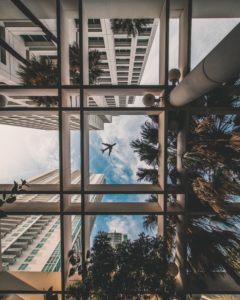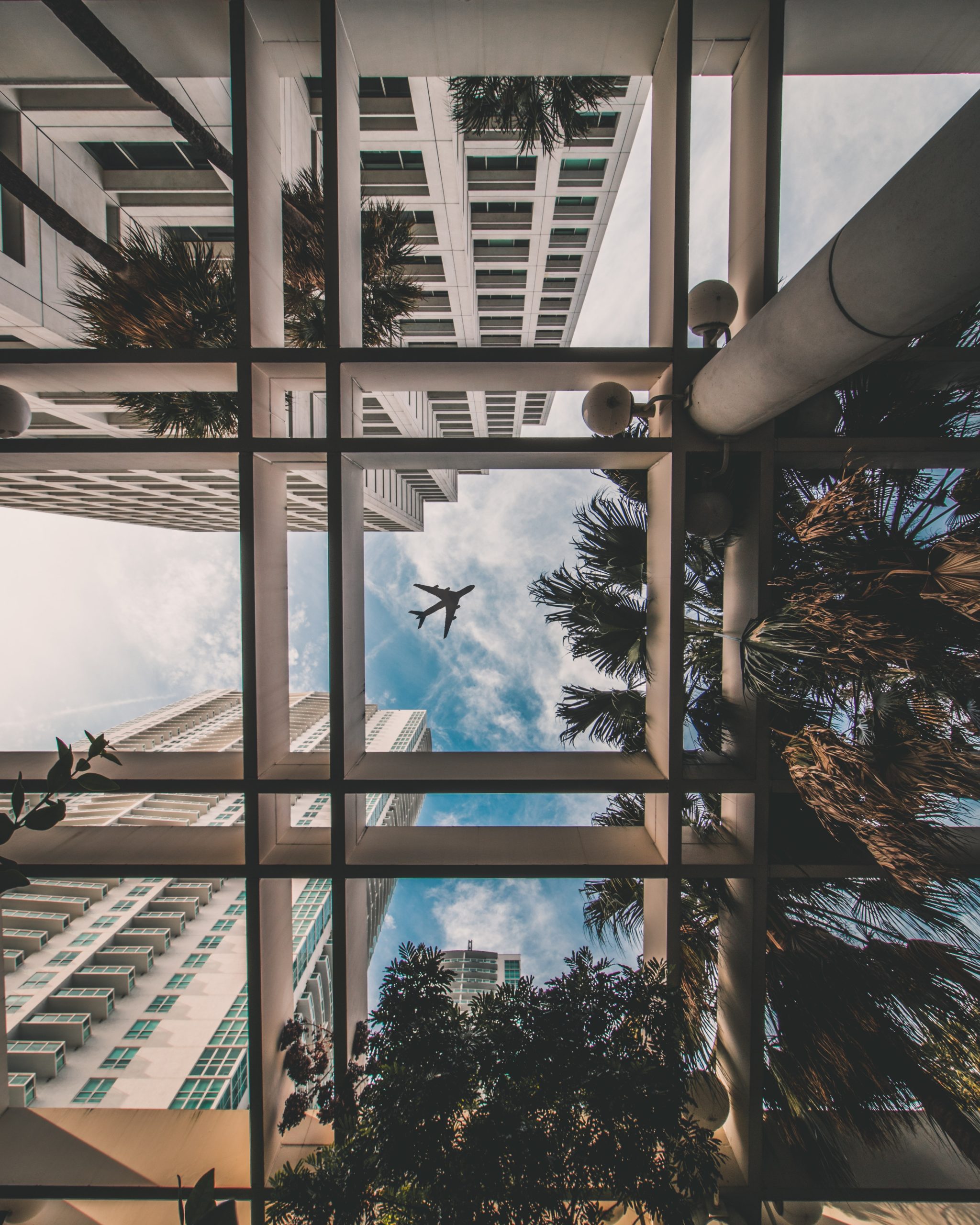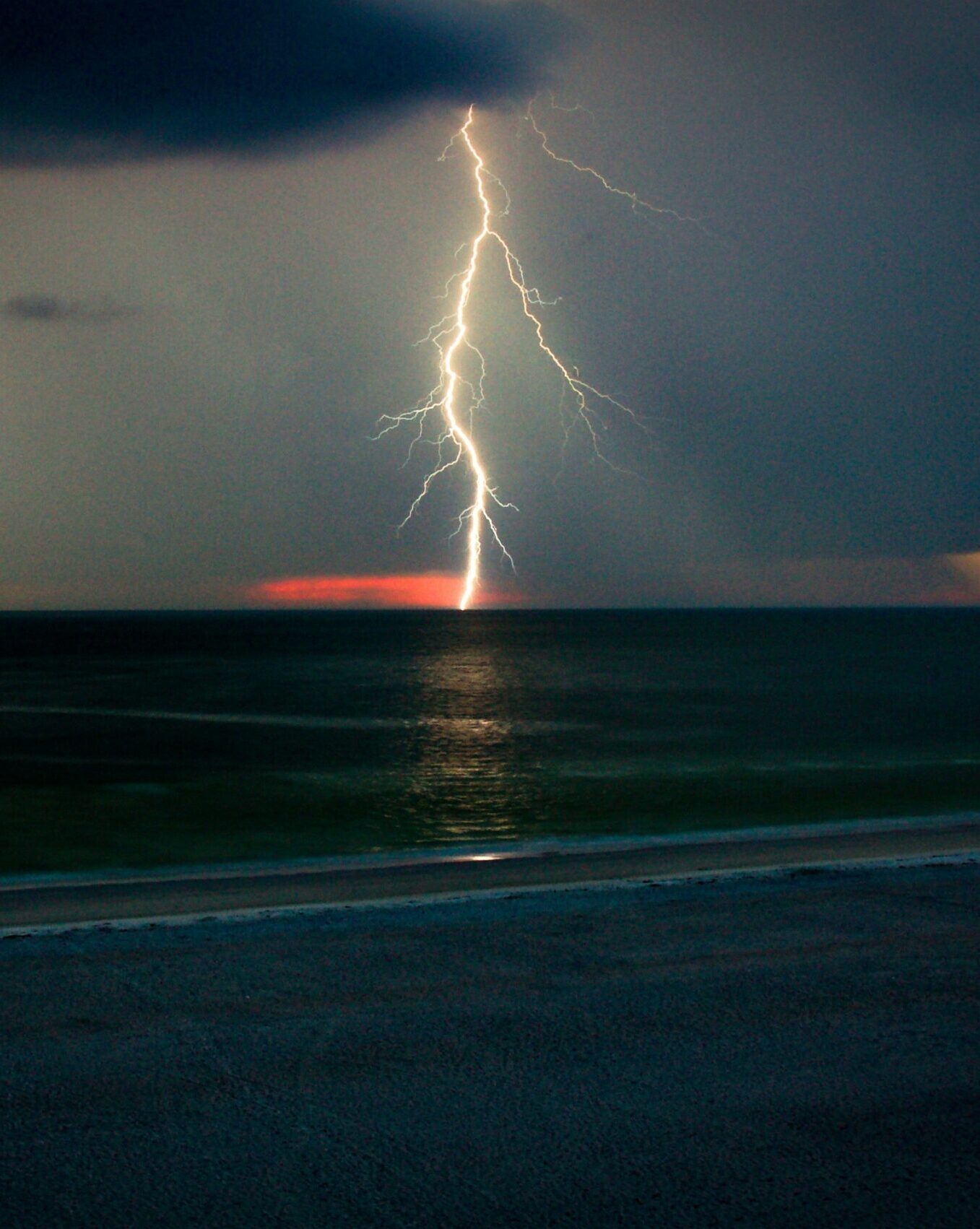
Miami, FL
“I am fascinated by the beauty of sight,
but I never crave for it,” a blind actor says,
brushing his fingers across the petals of flowers
in a softly lit bazaar. The camera tracks
from his hand to his grey-tinged hair
as a market breeze circles his linen shirt
and bamboo chimes patter the air.
Palm-size hollows of rain ripple
on the cobblestones, revealing there,
as the camera draws in, the digitized name
of the hotel in which my family and I
temporarily reside. The television loop
fades to black then starts again, resetting
the feed. Beyond the second-floor balcony,
I can see in the hotel pool my two daughters
and their mother—Margaret bobbing
in her chest-and-shoulder-strap floatation
vest (a device somehow come to be known
as a “puddle jumper” or a “splash jammer”)
while Sibley clasps her hands above her head,
bends at the waist, and dives from the edge
of the board, disappearing beneath
the water then rising to the arms of my wife.
So the cycle goes—Sibley climbs the ladder
to dive again, and Margaret ambles
from the pool steps to the deck, darting
around the lip like a sandpiper.
In a moment, I will join them, as I have
so many times before, hotel after hotel,
either before or after a visit to a hospital
or doctor’s office, their florescent-lit
or shades-drawn rooms—hollows
of time, of waiting—spaces as shuttered
as Margaret’s sightless left eye,
stalking having grown en utero
throughout the vitreous, branching
there like a tree in perpetual night,
the eye’s architecture impervious to any
window drawn with a surgeon’s blade.
In Italian, the word “stanza” means
“room,” and I often tell students
to think of a room when selecting
their words, that what is the body
but a collection of rooms? “Lamentable”
was a word one surgeon used regarding
Margaret’s eye. “Irredeemable” was
another. So the cycle goes, not only for us,
but for the others as well—the young
couple whose sightless daughter wakes
at all hours, unaware of the transition
between day and night. 3 a.m., she stands
up in her crib and wants to play, her mother
told us in the pastel halls of Bascom Palmer,
and how can you hold it against her?
Last night we slept, the father said,
for five consecutive hours, the first time
in a year, a slight catch in his voice
when he spoke, a quiver I have heard
in my own words as well, like a hairline
crack in good china, or ripples on the surface
of a pond. Researchers say that with no
knowledge of sight, a person who is born
blind does not dream in images,
but primarily in touch and sound.
I thought of this today as my wife and I sat
in our car following Margaret’s fitting
for a prosthetic eye, both daughters asleep
in their car seats, our engine idling
as airplanes rose like glinting whales
above us from what seemed like just
beyond the rooftops of buildings
on the other side of an unadorned park.
My wife photographed Margaret’s eyelid
closed over the new prosthetic, the cellphone
snapshot a request from the ocularist to whose
office we returned when Margaret woke,
then back to the hotel where we are now.
As I have so many times before, I place
the palm of my hand over my left eye
and review the words I have written
on my laptop screen, then look out
to my family in the hotel pool.
I have done this when driving or reading,
when gauging a step from the curb—to try
to see as Margaret sees, and answer
the questions my wife and I have
about Margaret’s perception of depth
or her field of vision, which is really
a question about the future, about what can
and cannot be foretold. I turn my head
and my family disappears into darkness
at the ridge of my nose—a mountain range
behind which they set. I turn back,
and they reappear. Our dreams,
those same researchers said, are a way
of rehearsing our fears, that we learn
from them the ways in which to persist
and prepare. So be it. We are most
alike in that darkness, waking in fear,
desperate for some calming touch,
for the voice that whispers, I am here…
Jonathan Fink is Professor and Director of Creative Writing at University of West Florida. He has published two books of poetry: The Crossing (Dzanc, 2015) and Barbarossa: The German Invasion of the Soviet Union and the Siege of Leningrad (Dzanc, 2016). He has also received the Editors’ Prize in Poetry from The Missouri Review, the McGinnis-Ritchie Prize for Nonfiction/Essay from Southwest Review, and fellowships from the National Endowment for the Arts, the Florida Division of Cultural Affairs, and Emory University, among other institutions. His poems and essays have appeared in The New York Times Magazine, Poetry, New England Review, TriQuarterly, The Southern Review, Virginia Quarterly Review, Slate, and Witness, among other journals.
Photo courtesy of unsplash.com.




